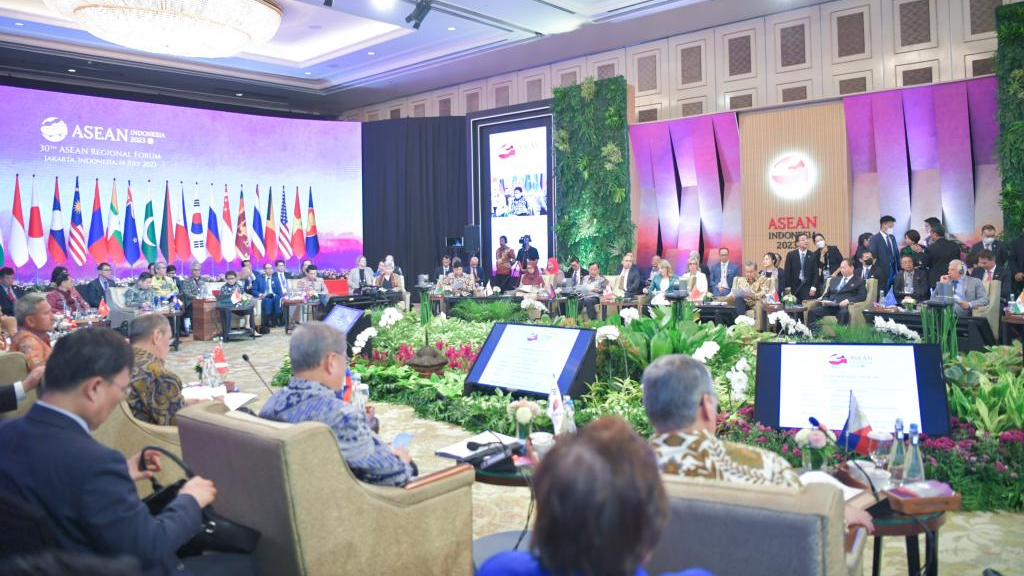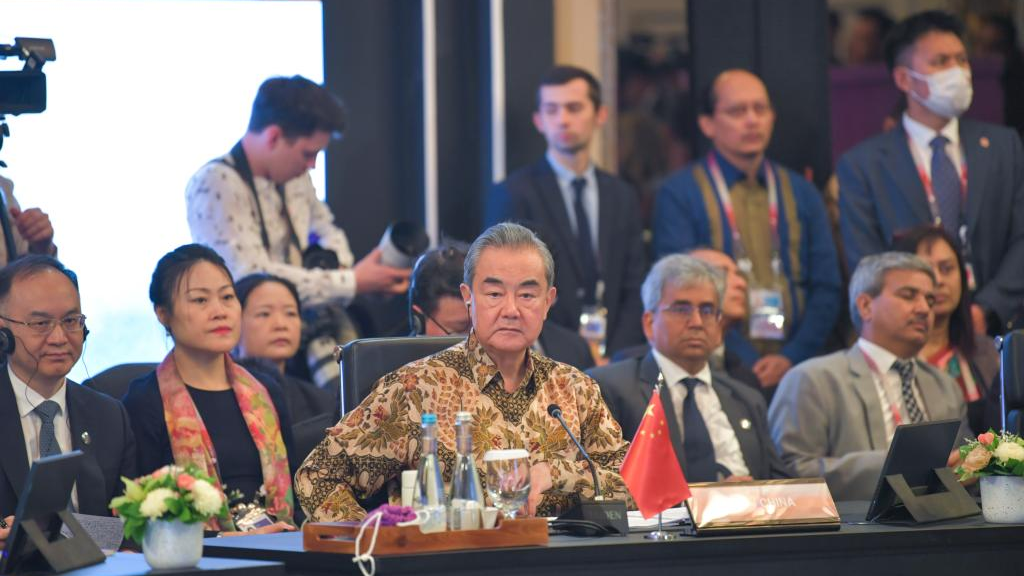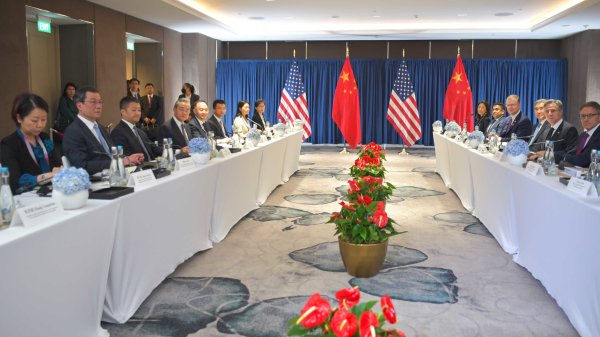Senior Chinese diplomat Wang Yi has wrapped up his trip to Jakarta, Indonesia, after taking part in a series of ASEAN foreign ministers' meetings and sideline discussions on Thursday and Friday.
During the meetings, Wang, director of the Office of the Foreign Affairs Commission of the Communist Party of China (CPC) Central Committee, voiced China's support for the centrality of ASEAN, called for openness and inclusiveness, urged the promotion of common security, and advocated for true multilateralism and the enhancement of positive interaction.

Wang Yi, director of the Office of the Foreign Affairs Commission of the CPC Central Committee, attends the ASEAN Regional Forum (ARF) foreign ministers' meeting in Jakarta, Indonesia, July 14, 2023. /Xinhua
Wang Yi, director of the Office of the Foreign Affairs Commission of the CPC Central Committee, attends the ASEAN Regional Forum (ARF) foreign ministers' meeting in Jakarta, Indonesia, July 14, 2023. /Xinhua
On common security
Wang said at the ASEAN Regional Forum (ARF) foreign ministers' meeting on Friday that the Asia-Pacific region does not need an arms race, and cannot engage in bloc confrontation.
He stressed during several meetings that regional countries must guard against three negative trends concerning peace and security in the region.
The first negative trend, Wang said, is the impact on ASEAN centrality and the ASEAN-centered effective regional cooperation architecture, brought by the penetration of the "Indo-Pacific strategy."
He identified the second trend as the North Atlantic Treaty Organization's attempts to intrude into the region, which he warned would introduce the Cold War mentality and camp confrontation, and undermine the hard-won peace and stability.
The third trend, the senior Chinese diplomat said, is non-regional major powers using the South China Sea issue to intervene in regional affairs, sow discord, and undermine solidarity and cooperation in the region.
Expounding on China's principled position on the South China Sea issue, Wang stressed that China rejects hegemony of navigation in the name of freedom of navigation.
The South China Sea is currently one of the safest and most open waters in the world for navigation, he said, noting that China and littoral countries of the South China Sea abide by international laws, including the United Nations Convention on the Law of the Sea (UNCLOS).
China has always advocated the peaceful settlement of disputes through friendly consultations among countries directly concerned, which is a principle that has also been written into the Declaration on the Conduct of Parties in the South China Sea, the senior diplomat said.
Wang noted the completion of the second reading of the Code of Conduct in the South China Sea (COC) text, and pledged to work together with relevant countries to promote the COC to become an effective, substantive and lawful regional framework to better safeguard peace and stability in the South China Sea, and effectively guarantee the lawful rights and interests of countries outside the region.
He said that he hopes countries outside the region would respect the efforts made by China and ASEAN, and play a positive role in maintaining regional stability. China and ASEAN do not need condescending instructors, but have full confidence, wisdom and capability to properly resolve the South China Sea issue through joint efforts, he added.
The South China Sea arbitration is clearly a political manipulation, deviating from the original intention of the UNCLOS, Wang added. From the very beginning, China did not participate in the arbitration and will never accept it, he noted. He warned against the practice of certain countries to reverse history and hype up "old tricks."
Wang also said that the discharge of nuclear-contaminated water by Japan into the ocean would have a bearing on the safety of the marine environment and the health of human lives, and is a matter of great importance and thus should not be conducted without authorization.
While meeting with Japanese Foreign Minister Yoshimasa Hayashi, Wang urged the Japanese side to face up to other parties' legitimate concerns and experts' opinions, scientifically verify different discharge approaches, and avoid self-assertion, adding that sincere communication and a prudent manner are necessary for handling the matter.

Wang Yi, director of the Office of the Foreign Affairs Commission of the CPC Central Committee, attends the 13th East Asia Summit Foreign Ministers' Meeting in Jakarta, Indonesia, July 14, 2023. /Xinhua
Wang Yi, director of the Office of the Foreign Affairs Commission of the CPC Central Committee, attends the 13th East Asia Summit Foreign Ministers' Meeting in Jakarta, Indonesia, July 14, 2023. /Xinhua
On ASEAN centrality
At multiple occasions, Wang Yi stressed the importance of earnestly supporting the centrality of ASEAN and building a solid foundation for peace.
ASEAN centrality is the natural result of historical evolution and the greatest common ground of all parties, Wang said while attending the 13th East Asia Summit Foreign Ministers' Meeting on Friday.
Regional peace depends on the common development and prosperity of all countries, and should not be based on a few countries' pursuit of absolute security, he said, vowing to explore cooperation with other parties centered on the Global Security Initiative.
"China always stands for maintaining ASEAN unity and cooperation, supports ASEAN community building, and will continue to play a constructive role in its own way," he said during a meeting with Thai Deputy Prime Minister and Foreign Minister Don Pramudwinai.
On cooperation
Cooperation was another keyword during the meetings. Wang lauded that China and ASEAN have expanded mutually beneficial cooperation on all fronts, blazing the right path of forging long-term good-neighborliness while achieving common development and prosperity,
While attending the China-ASEAN (10+1) Foreign Ministers' Meeting on Thursday, Wang said both sides have worked together on building a community with a shared future and the Belt and Road Initiative, while jointly promoting regional economic integration, and consolidating the foundation of peace and stability.
He pledged that China will be committed to high-quality development and provide new opportunities for all countries with Chinese modernization, adding that it is ready to strengthen solidarity and coordination with ASEAN to advance the modernization process in Asia.
Joint efforts should be made to safeguard the right direction of economic globalization and stay committed to an open, free, fair, inclusive and rules-based multilateral trading system, he said at the 13th East Asia Summit Foreign Ministers' Meeting.
Wang voiced opposition to both protectionism and "decoupling and severing supply chains," while advocating for the promotion of the building of the Asia-Pacific Free Trade Area, and a regional development environment of healthy competition and win-win cooperation.
China has provided support for economic and technological cooperation under the Regional Comprehensive Economic Partnership (RCEP) and helped ASEAN countries enhance their abilities to implement the RCEP free trade deal, Wang said during the ASEAN Plus Three (APT) Foreign Ministers' Meeting on Thursday, calling for openness and cooperation to promote the high-quality implementation of RCEP.

Wang Yi, director of the Office of the Foreign Affairs Commission of the CPC Central Committee, meets with U.S. Secretary of State Antony Blinken in Jakarta, Indonesia, July 13, 2023. /Chinese Foreign Ministry
Wang Yi, director of the Office of the Foreign Affairs Commission of the CPC Central Committee, meets with U.S. Secretary of State Antony Blinken in Jakarta, Indonesia, July 13, 2023. /Chinese Foreign Ministry
On major country diplomacy
Wang also met with a slew of foreign ministers on the sidelines of the ASEAN foreign ministers' meetings, during which he highlighted the importance of stable bilateral relations and practical cooperation, and called for the safeguarding of the common interests of both sides.
Noting that China and the U.S. have reached some common understandings in recalibrating the giant ship of China-U.S. ties, the senior Chinese diplomat pointed out during a meeting with U.S. Secretary of State Antony Blinken that the two sides need to start with specific steps to create conditions and remove disruptions for stabilizing bilateral relations.
Regarding the Taiwan question, Wang outlined China's solemn position, and urged the U.S. to avoid wantonly interfering in China's internal affairs or undermining China's sovereignty and territorial integrity, stop suppressing China in economy, trade, science and technology, and lift the illegal and unwarranted sanctions against China.
Wang reiterated during the 13th East Asia Summit Foreign Ministers' Meeting that the Taiwan question is China's internal affair and it tolerates no interference from external forces.
"We are willing to make the greatest efforts with utmost sincerity to strive for peaceful reunification, but our determination and resolve to defend national sovereignty and territorial integrity remain unwavering," he noted.
Hailing China and Russia's firm support for each other in safeguarding their legitimate interests and adhering to the path of harmonious coexistence and win-win cooperation, Wang called on both sides to jointly promote world multi-polarity and greater democracy in international relations during his meeting with Russian Foreign Minister Sergei Lavrov.
While meeting with South Korean Foreign Minister Park Jin, Wang said China's good-neighborly and friendly policy toward South Korea is consistent and stable, adding that it is not targeted at any third party and should not be influenced by any third party.
China-Japan relations are at a crucial juncture, Wang told Japanese Foreign Minister Yoshimasa Hayashi, noting that Japan's positioning of China as the greatest strategic challenge and hyping up the "China threat" is seriously inconsistent with the reality of China-Japan relations and runs counter to the important consensus of "be partners, not threats."
Wang expressed the hope that Japan will establish an objective and rational understanding of China and bring bilateral relations back on track with sound and steady development, adding that China is open to maintaining contacts at all levels, economic and trade exchanges and people-to-people exchanges.
(With input from Xinhua)